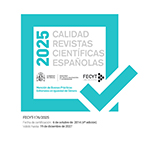La gran zozobra roja. Argumentos para la extensión de la Enseñanza Media en España (1953-1961)
Resumen
La enseñanza secundaria española sufrió un notable cambio en la década de 1950. Se produjo la ruptura efectiva del modelo de enseñanza dual, al permitir a chicos y chicas de familias obreras y de escasos ingresos accedieran al bachillerato, lo que les estaba prácticamente vetado hasta entonces. Las autoridades educativas otorgaron tanta importancia a esa política que tuvo denominación específica: la extensión de la enseñanza media. Este trabajo se centra en el análisis del discurso que apoyó y explicitó tal política. Para ello se han localizado declaraciones y tomas de posición de los principales responsables del ministerio de educación que conformaron el discurso oficial que impulsó dicha política, las cuales hasta ahora apenas han sido estudiadas. Tras su análisis, se han identificado diversos argumentos que se han agrupado bajo las categorías de: económicos, sociales, territoriales y políticos. Entre ellos destacan algunas explícitas referencias a la utilidad de la ampliación del bachillerato a núcleos obreros, para superar el temor y la gran zozobra roja de los burgueses del interior de las urbes. Por ello la política de extensión de la enseñanza media, que tuvo innegables consecuencias educativas y sociales, debe considerarse un elemento muy destacado del modelo cultural comprensivo con los perdedores de la Guerra Civil, impulsado por un sector del régimen franquista.
Descargas
Descarga artículo
Licencia
La Revista Complutense de Educación, para fomentar el intercambio global del conocimiento, facilita el acceso sin restricciones a sus contenidos desde el momento de su publicación en la presente edición electrónica, y por eso es una revista de acceso abierto. Los originales publicados en esta revista son propiedad de la Universidad Complutense de Madrid y es obligatorio citar su procedencia en cualquier reproducción total o parcial. Todos los contenidos se distribuyen bajo una licencia de uso y distribución Creative Commons Reconocimiento 4.0 (CC BY 4.0). Esta circunstancia ha de hacerse constar expresamente de esta forma cuando sea necesario. Puede consultar la versión informativa y el texto legal de la licencia.











